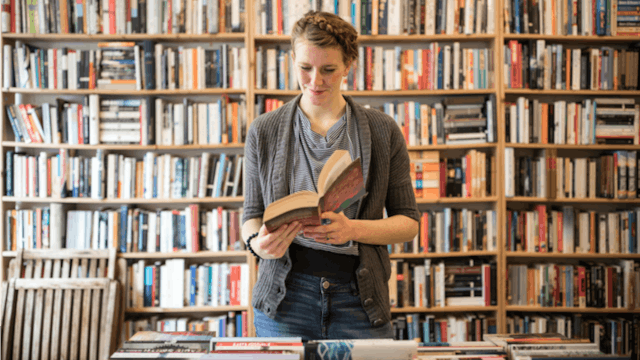Why You Should Surround Yourself With Books -- Even If You Don’t Have Time To Read Them

I’ve always been an avid reader. I love words, stories, and the magical places they take me. But ever since I became a parent, I find it incredibly hard to fit reading into my life. And I know I’m not alone.
Sure, I’ve read just about every children’s book and YA novel out there to my kids – and some of them are quite amazing. I also read an ungodly amount of content on the internet. I don’t discount that as real reading either.
But there is something beautiful and intoxicating about reading an honest to goodness book. Try as I might, though, I only end up reading about one novel a year (if that!) and a couple of books of poems here or there (I know barely anyone reads modern poetry, but it’s a love of mine). It’s embarrassing when I consider how little I read.
I try to read. I really do. If I hear about a book that sounds good, I immediately go to Amazon and order the heck out of it. I probably spend way too much money on books. But then they just end up sitting there on my bedside table, coffee table, all over the damn house…collecting dust.
Me with my current stash of unread, half-read books.
Sometimes on a weekend afternoon when my kids are occupied for a half hour – and I’m not cleaning, doing laundry, or paying bills – I’ll sneak a peek at one of those books. I’ll read a few pages, a chapter, and then I’ll be interrupted, never to pick the book up again. It’s depressing.
But it turns out that maybe all the books I haven’t been reading are a blessing in disguise, and they really are adding richness to my life. Just take it from Nassim Nicholas Taleb, author of The Black Swan: The Impact of the Highly Improbable. I recently came across a quote from Taleb that changed my thinking about all the non-read books piling up in every corner of my house.
The quote, excerpted from The Black Swan, was posted on the Brainpickings blog, and refers to Italian writer Umberto Eco, whose legendary library contained a whopping 30,000 books (some of which one assumes he did not have time to read!).
“Read books are far less valuable than unread ones,” writes Taleb. “The library should contain as much of what you do not know as your financial means, mortgage rates, and the currently tight real-estate market allows you to put there.”
Taleb goes on to say that we should call our unwieldy, overwhelming collection of unread books our “antilibrary,” and that we should have pride in it because it’s a symbol of our hunger for knowledge – and there is value in the knowledge we don’t yet have, but that we crave. In fact, it’s the “unknowing” that keeps us more curious, interested, and thoughtful.
“You will accumulate more knowledge and more books as you grow older, and the growing number of unread books on the shelves will look at you menacingly,” he writes. “Indeed, the more you know, the larger the rows of unread books. Let us call this collection of unread books an antilibrary.”
Oh my goodness, I couldn’t love this more. And I think it’s 100% true. Yes, we may not get a chance to read everything among the endless unread books we have, but they still get us thinking, wondering, wanting to seek more knowledge, ideas, perspectives, you name it.
Also, I don’t know about you, but there is just something cozy and warm about all the books in my life. I’m pretty big on decluttering, and I do get rid of books sometimes. But there is a beauty – a kind of security, even – of having all the books everywhere, piled up in every nook and cranny of my home.
So next time you get all guilt-ridden and stressy about all the non-reading you’ve been doing or all the books you never finish, tell yourself that you are housing a fantastic “antilibrary.” And that you are a freaking genius because of it.
You know what else? Someday – maybe not until our kids head off to college – we are all going to read all those books. I just know it. And the wonderful stories contained in them will be there for us, patiently waiting, dust and all.
This article was originally published on